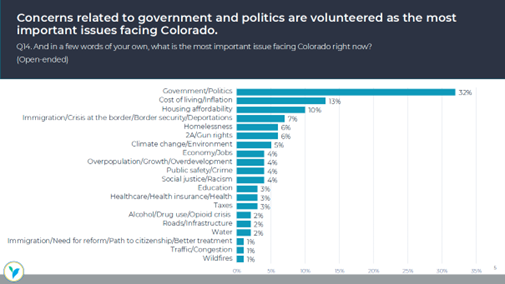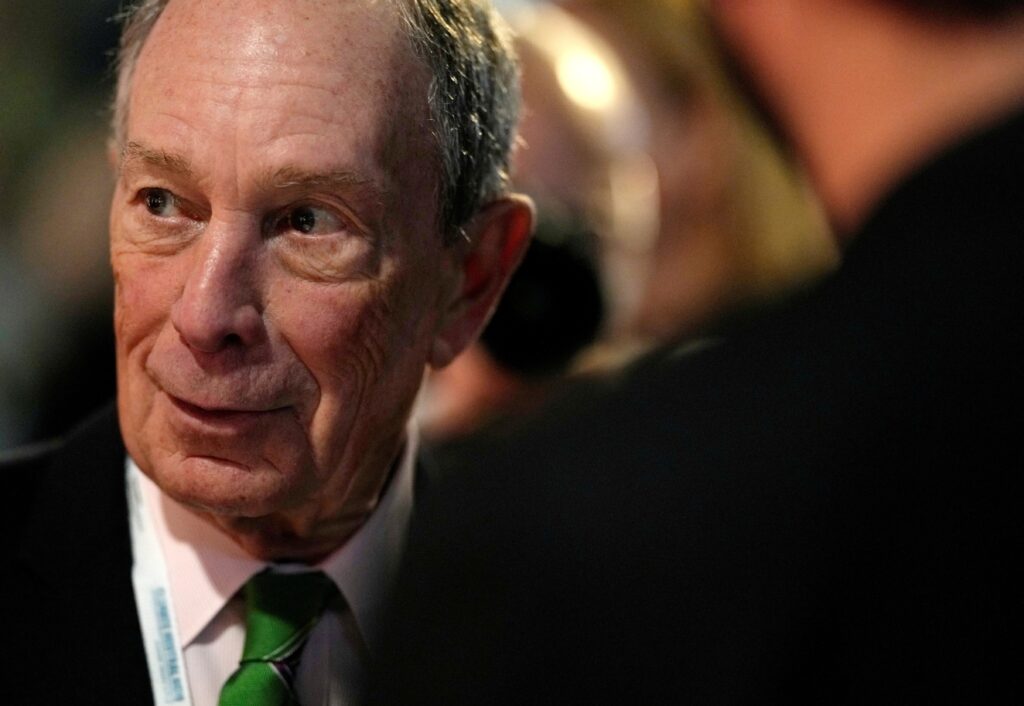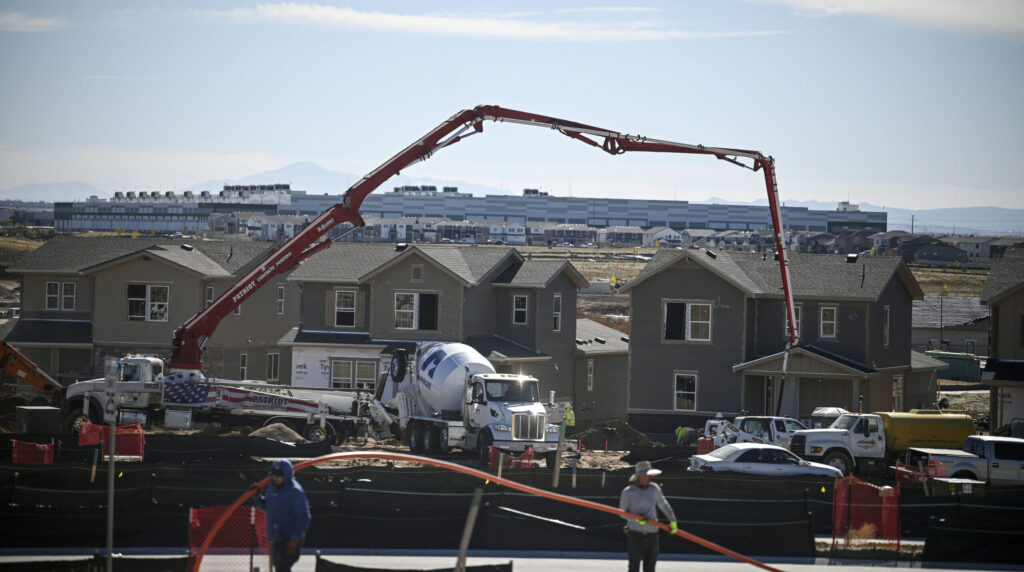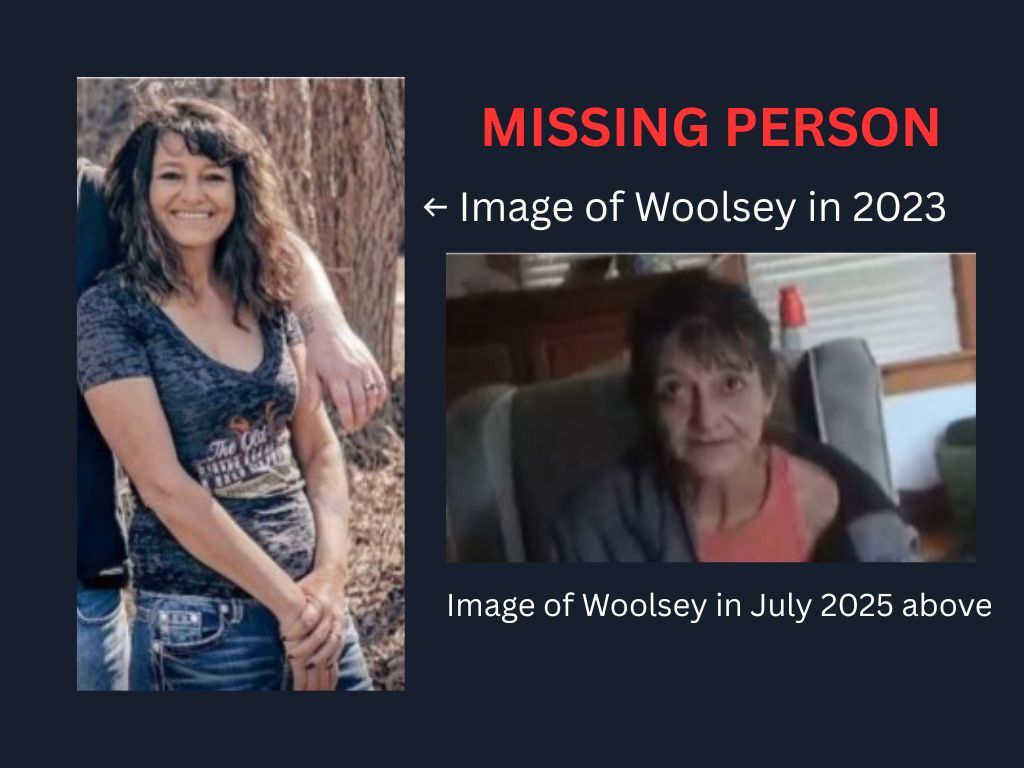Government and politics are top concern for Coloradans, according to annual survey
Government corruption and political division are the top concerns among Coloradans, according to the Colorado Health Foundation’s 2025 Pulse survey.
For its sixth annual survey, conducted from April to May 2025, CHF polled 2,333 Coloradans from across the political and socioeconomic spectrum. Of those surveyed, 32% identified government and politics as their top concern — a 21% increase from last year’s poll. Cost of living and inflation, which topped the list in 2024, dropped by six and seven percentage points, respectively, to 13% and 10%.
According to Democratic pollster Dave Metz, who helped conduct the survey, 19% of respondents criticized the Trump administration and Republican leadership. Conversely, 9% criticized Gov. Jared Polis’ administration and Democratic leadership.
“Politics permeates almost everything about views of the direction of the state and how they view the economy,” said Lori Weigel, Republican pollster for the Pulse Poll and principal of New Bridge Strategy. “Many are feeling very uncertain and the concerns that respondents have been expressing over the past several years have not gone away. We just added a layer of uncertainty about the direction of the country on top of these underlying concerns.”
Coloradans unsure of solution
Despite widespread concern about local and national politics, most respondents seemed to believe that grassroots efforts — such as publicly expressing support for social causes and speaking to elected officials — have little impact. Volunteering, however was viewed as the most effective way to effect change, with Democrats 23% more likely to say that volunteering was effective than Republicans.
“We’ve heard for years that people do not believe political leaders listen to them or act in the best interest of the voters,” said Weigel. “Trust in government has eroded and people don’t have confidence that their efforts to influence government will make a difference.”
Health care affordability
Seventy-five percent of respondents said they’re concerned about the rising health care costs — the highest number to date. Nearly 40% said they were worried that they or someone in their household could lose health insurance coverage in the next year. The leading cause for that concern was potential job loss, while another 16% of respondents said they were concerned about being unable to afford insurance.
Black Coloradans, young people, and residents of Morgan, Weld, Pueblo, and Boulder counties were the most likely to have concerns about the rising cost of health care.
According to the Colorado Association of Health Plans, the state’s health care spending increased by 139% from 2013 to 2022. Out-of-pocket costs for senior patients on fixed incomes who have Medicare Advantage plans rose 80% in that same period, and health insurance premiums rose nearly 20% from 2022 to 2023, among the highest increases in the country.
Over 55% of survey respondents also reported recent mental health struggles like depression, anxiety, loneliness, and stress. Among them, 32% named political issues as the primary contributor, while 29% cited financial concerns.
“Even as we move further past the pandemic, most Coloradans report experiencing mental health strain – whether it comes from the financial struggles they face day-to-day, or the political developments they are reading about in the news,” said Metz.
Cost of living is ‘extremely serious’
Nearly 60% of all respondents said the cost of living in Colorado is an “extremely serious” problem, up over 20 percentage points since CHF’s first Pulse Survey in 2020. An additional 55% of Coloradans said the same about housing costs, and about one-third expressed concerns about losing their home due to inability to pay their rent or mortgage. A quarter of those individuals say they’ve gone without food or health care to afford housing.
Of the renters surveyed, 25% said they have avoided asking their landlord to address problems with their home out of fear they’ll have their rent increased or be evicted.
Seventy percent of respondents, including 60% of the state’s highest earners, say they’re worried they won’t be able to afford to live in Colorado in the future.
About one-third of respondents said they’re concerned they can’t afford enough food to properly feed themselves and their families, down four percentage points from last year. Financial issues seem to be more widespread for Coloradans of color, with a quarter of Asian and Latino respondents and 26% of Indigenous respondents saying they have had their work hours or wages reduced in the past year.
The official Pulse dashboard with all of the survey’s results will be available on CHF’s website in August.















